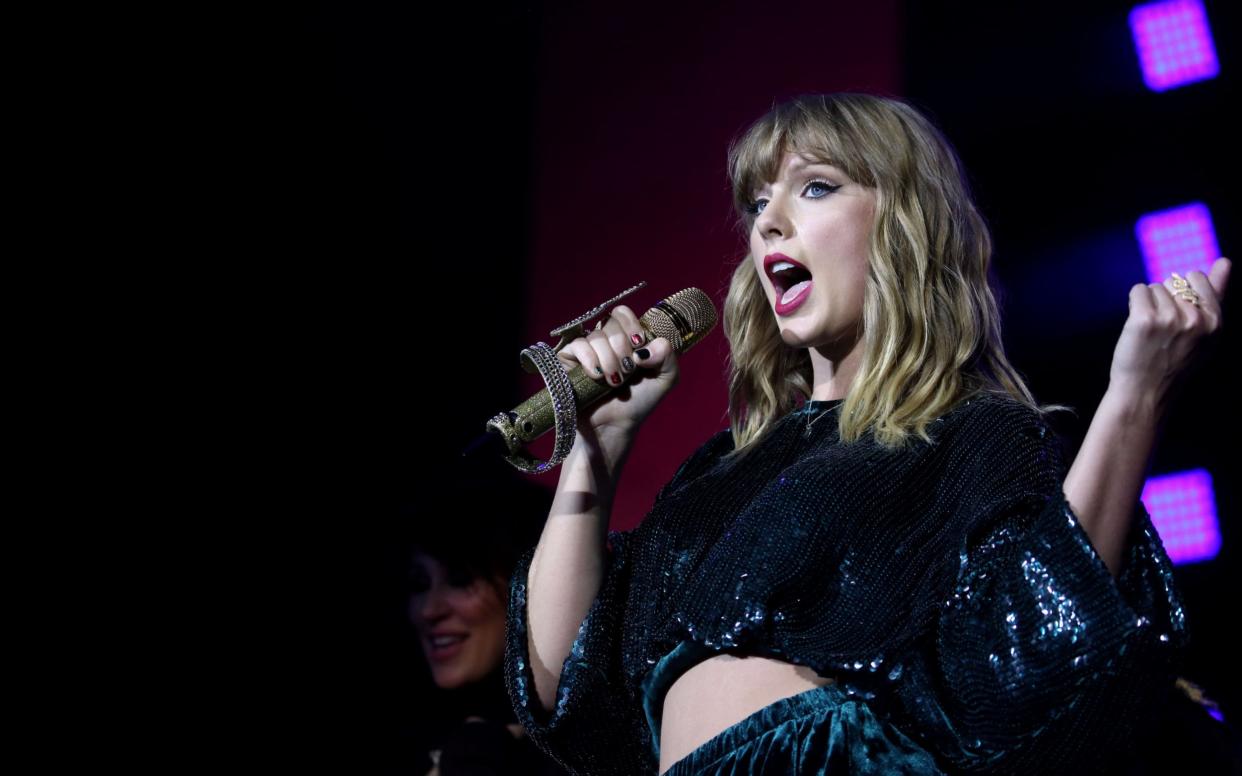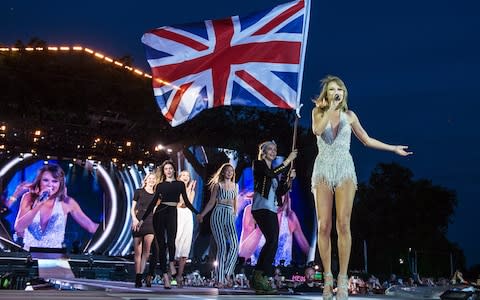Taylor Swift's Reputation Tour puts off fans and struggles to sell out – but Swift may have the last laugh

Traditionally, tickets to Taylor Swift tours have been tricky to get hold of. Tickets for her last one, The 1989 World Tour, sold out in minutes in 2014. Securing entry to her 2013 Red Tour was such a fevered activity that sales records were broken in China. In 2009, Swift's Fearless tour saw her sell out New York's famed Madison Square Garden in just 60 seconds.
Three weeks after tickets went on sale for Swift's 2018 Reputation tour, however, and there are still seats available in stadiums around the world. In fact, none of her US or UK dates has sold out.
So what's going on? Across the Pond, tabloids are declaring that Swift's forthcoming tour is "shaping up to be a disaster". The New York Post claims that "sales so far have been a mega disappointment. There are hundreds if not thousands of tickets left for every show," and screengrabs of ticketing websites for stadiums from New York to Chicago and beyond suggest that very few people received tickets for Christmas. As Digital Music News reports: "Nearly every section [of a Massachusetts stadium] has endless availability".
It's not difficult to link the slow sales to a new strategy that Swift, with Ticketmaster, has adopted for her Reputation tour. Part of the reason why tickets sold so quickly in the past was because touts were able to use bots that would automatically buy dozens of tickets to sell immediately for a far higher price on the secondary market.
In-demand events such as Adele's 2016 tour and Hamilton's West End run have attempted to quell touts by making fans register before they buy and introducing paperless ticketing. Swift has embarked upon a different approach in the US: raise ticket prices, and use Verified Fan technology.
In August, Swift introduced "Taylor Swift Tix", a portal on Ticketmaster Verified Fan that granted fans the option to register and select the city where they would like to buy tickets, before giving them the "opportunity to engage in unique activities that advance your spot in line". Often, these activities would involve buying merchandise, such as a Swift T-shirt ($45) or ring ($60).
Fans were left upset by the strategy, which gave those who spent more money priority access to tickets, even though prices weren't listed at this time, leaving customers unaware if they could even afford the tickets they were getting in line to buy.
Ok honestly this is so annoying. I understand it'll help eliminate bots but I am a die hard why should I have to buy expensive merch... pic.twitter.com/ROLsJwcqvJ
— Maddie (@AllTooTaylor__) August 25, 2017
To get "further in line" to buy Taylor Swift tickets she wants you on buy merch from her. AHAHAHAHAHA this greedy snake I can't.
— Taryn Rosé (@Q_Taryntino) August 27, 2017
Taylor Swift, reminder, your fans are getting degrees in uni and colleges that scam us on tuition fees. Be good to us with the tour tickets.
— ️ ️ (@repawtation) August 26, 2017
Furthermore, even though Ticketmaster doesn't use Verified Fan in the UK, British fans were left confused over whether the Taylor Swift Tix "boosts" – which allowed them better access to tickets – were valid for buying tickets to her UK dates.
Does anyone know anything about Taylor Tix Boosts for the uk? pic.twitter.com/v6kr7oZr1E
— Melissa (@taylor_isdead) November 24, 2017
the UK and Ireland didn't even get taylor swift tix so watch all the tickets get bought by scalpers and fake fans anyway and sold for double the price, there's literally no way any of us will be able to see her
— sophie ♡ 157 (@literaryswift) November 27, 2017
When ticket prices were released in early December, many fans were left disappointed: in the US, prices ranged from $50 for tickets at the top of the stadium, to $250 on the floor. For the best seats and VIP options, fans would have to shell out between $800 and $1,500 per ticket. Some commented that they had logged onto the Taylor Swift Tix portal, only to find that their allocated tickets would cost half of their monthly salary.
In the UK, it was a similar story. Prices started at £83.70 for a ticket in the most far-flung Wembley stadium seats. Confusingly, the "Platinum" tickets offered by Ticketmaster for £190 offered a worse view than the £132 - £340 "snake pit" tickets, which allow fans to stand on either side of the stage. Stadium hospitality packages ranged between £267 to £417, and VIP packages will set fans back £585 to £735. In 2014, Forbes was reporting that Swift's 1989 World Tour was the most expensive yet, and UK ticket prices started at just £63.40.
The situation has left some of Swift's most devoted fans no option but to opt out of the Reputation tour. "The system was so confusing, I don't know anyone going," Sarah Cameron, who went to Swift's earliest UK shows, tells The Telegraph. "Loads of fans I know tried, most of them through gritted teeth and total objection to the prices."
But while the higher prices have been contentious, they are paying off for Swift. In fact, industry experts predict that the Reputation tour could become one of the highest grossing of all time, with $450 million of tickets sold by its close at the end of this year. For context, U2 grossed the 2018 equivalent of $801,130,818 with their 360º Tour (tickets for which started at €30), so far the highest-grossing tour ever. Swift currently holds the 17th-highest grossing for the 1989 World Tour, which grossed $250,733,097 in ticket sales. On Wednesday, a further seven shows were added to the US leg of the Reputation tour "due to overwhelming demand".

Despite sales being sluggish, Swift had sold $180 million of tickets within the first week of them being on sale; that's four days of Verified Fan sales, and three on general. The sheer size of the stadiums in comparison to the arenas Swift used to play on tour explains both the number of empty seats and the high sales figures: Billboard reported that Swift had sold 110,000 tickets for two concerts at Los Angeles' Rose Bowl, which, even before selling out, is a significant increase on the 81,000 tickets she sold across six shows at the city's Staples Centre during her last tour.
Swift is expected to sell the Reputation Tour out, but only in the nick of time. And that, says Ticketmaster, is intentional. David Marcus, the company's head of music, told Billboard in December: "We'd like to sell the last ticket to her concert when she takes the stage each night. We're not trying to sell all of her tickets in one minute; we're trying to figure out how to sell tickets in a more modern way."
This so-called "slow ticketing" model undeniably benefits the artist and music industry executives who are pocketing as much as a 30 per cent more as a result of the hike on ticket prices – it is expected that Swift and her promoter will earn an extra $1-1.5 million per show in revenues. But, industry executives argue it also makes life easier for frustrated fans left shortchanged by touts selling on the secondary market. Instead of paying hundreds of pounds for initially cheap, re-sold tickets, fans are granted extra time to spend the same amount on tickets bought from official vendors.
Marcus continued: "It shifts the model from one that is about momentum, which promoters are always trying to keep going during a ticket sale, to a demand-driven approach where fans can come in at a scheduled time and shop from an interactive map. It's replacing momentum with consumer choice and experience."
That "choice and experience", however, comes at a cost that not all fans are willing or able to afford.

